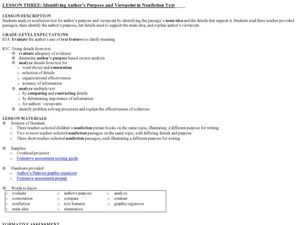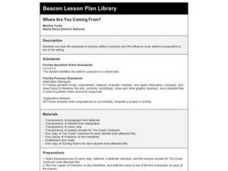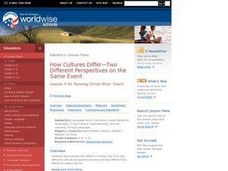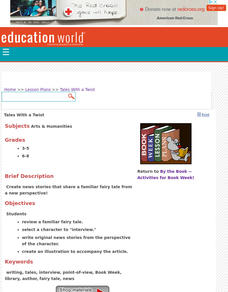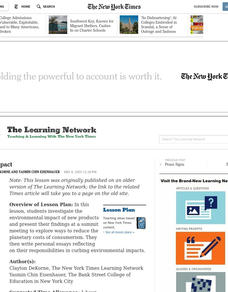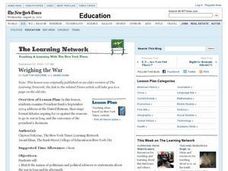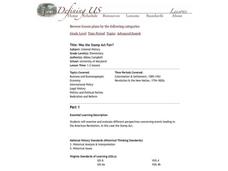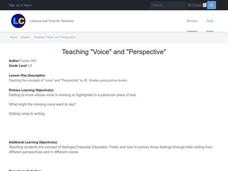Curated OER
Lesson: Storyboarding Revolution
Kids consider revolution as a basis for creativity, art, and storytelling. After reading an excerpt from the book, Persepolis, learners choose one event from any world revolution to write about. They storyboard the event focusing on...
Curated OER
Identifying Author’s Purpose and Viewpoint in Nonfiction Text
Why do people write books? Pupils discover how to identify the author's viewpoint. They read non-fiction passages their instructor selects (the plan has the class look at nonfiction children's picture books), and then identify the...
Curated OER
Perspectives on September 11,2001
Fifth graders will learn about various perspectives around events. They will need to take on the perspectives of various key people during the September 11 attack. Then they will write in their journals about the incident. They read...
Curated OER
Author's Day
Have your learners choose an author to study. One resource link gives a list of approved authors. Scholars read at least three works produced by that author and produce three separate book reports as well as a two-page author report....
Curated OER
Pet Perspective
Discuss point of view through a familiar medium: your pet! Learners write a story from the perspective of their own or the class pet. Prompts such as "My Family" (or "My Class"), "My Day," and "A Day in the Life of a _________" help...
Curated OER
Where Are You Coming From?
Pupils examine and discuss author's purpose and the influence of an author's perspective in his or her writing. In groups, they read scenarios and respond to them from the perspective of a designated character. Materials are attached.
Curated OER
Hermeneutics: Teaching Students Author's Purpose
Your developing literary critics discuss 'perspective' and discuss how the same occurence can be interpreted by two different people in two different ways. They read Ryszard Kapuscinski's untitled poem, infer meaning of the poem, and...
Curated OER
Hawthorne: Author and Narrator
High schoolers examine the difference between a narrator and author. They read Nathaniel Hawthorne's novel, 'The Scarlet Letter,' write a description of the narrator, and research how Hawthorne was impacted by the politics of the time.
Curated OER
The Hundred Penny Box with Multiple Viewpoints and Persuasive Letter
Third graders read The Hundred Penny Box and complete comprehension activities. In these perspectives and letter writing lessons, 3rd graders read and discuss the story then complete a Venn Diagram to explore the different viewpoints in...
Curated OER
How Cultures Differ "Two Different Perspectives on the Same Event
Students read excerpts from Peter Hessler's River Town: Two Years on the Yangtze and discuss his difficulties in learning the language, cultural clashes and how cultural perceptions shape our understanding of the world.
Curated OER
Tales with a Twist
Your authors create news stories that share a familiar fairy tale from a new perspective. They review a familiar fairy tale, select a character to "interview," and write original news stories from the perspective of that character.
Curated OER
Deep Impact
How can acknowledging opposing viewpoints reinforce one's argument? Use this New York Times lesson to study consumerism and the environmental impact of new products. After reading the article "Whether a Hummer or a Hybrid, the Big...
Curated OER
Weighing the War
Study opposing viewpoints with this lesson, which examines President Bush's September 2004 address at the United Nations. Middle schoolers study the text of the address, and then stage formal debates arguing for or against the reasons to...
Curated OER
Cross-Cultural Dialogue Lesson
Students read and analyze a personal narrative written about a Peace Corps Volunteer teaching English in Guinea-Bissau, Africa. They discuss the concept of crossing cultures, analyze maps, complete worksheets, and develop a writing...
Newseum
Persuasion Portfolios
After class members brainstorm a list of current social and political issues, groups each select a different topic from the list to research. Teams create a portfolio of at least 10 examples of stories about their issue, stories that...
Curated OER
Bombs Away!
Examine the different perspectives on the future of United States Navy bombing exercises taking place on Vieques, Puerto Rico with this lesson from The New York Times. Here, young learners read "Islanders to Vote on Vieques Bomb Drills,"...
Curated OER
How Different Authors Treat Similar Themes - Elephants of Africa
Students watch videos about similar themes presented by two different authors about elephants and their relationship with humans. For this theme analysis lesson, students watch video segments, visit the given websites, and complete...
Curated OER
First Meeting of the Indians and the Europeans
Your class hears a Native American Indian point of view of Europeans' arrival in Louisiana. They assess how cultural perspectives (especially an insider's view) and native language can shape a story. Each pupil identifies the...
Curated OER
Was the Stamp Act Fair?
Elementary and middle schoolers examine and evaluate different perspectives concerning events leading to the American Revolution. In this case, they hone in on the Stamp Act. They research controversial bills, laws, or events of the time...
Curated OER
Applying KWL Guides to Sources with Elementary Students
What is a KWL chart? Here is a well thought-out activity that has learners use KWL charts to gain historical perspective. Your class examines primary sources about historical events and identifies what they know, want to know, and,...
Curated OER
A Test of Faith
Secondary schoolers investigate the debate surrounding the current sexual abuse crisis in the Catholic Church with this New York Times lesson. Through discussions and written reflection, they explore their own thoughts and opinions on...
Curated OER
Hey, Teacher, Leave My Kids Alone
What are the differences between homeschooling, traditional schooling, and unschooling? Middle and high schoolers examine the opinions of their peers on these varied types of education. After reading a New York Times article, they...
K20 LEARN
To Ban or Not to Ban? Intellectual Rights and Responsibilities: Banned Books, Censorship Part 2
After examining different perspectives on book banning, scholars select a book from a list of frequently banned books and research the controversies surrounding it. They then craft an argument about their chosen book, including arguments...
Curated OER
Perspective
Students explore the writing trait of voice. In this writing skills lesson, students read No, David! and discuss the author's use of voice. Students write a class version of the story called Yes, David! that incorporates an alternative...
Other popular searches
- Authors Viewpoint Reading
- Reading Author's Viewpoint
- Analyzing Author's Viewpoint
- Teaching Authors Perspective
- Author's Perspective Test
- Finding Author's Viewpoint
- Author's Perspective in Text
- Authors Viewpoint Passage
- Finding Authors Viewpoint
- Authors Perspective Map
- Analyzing Authors Viewpoint



